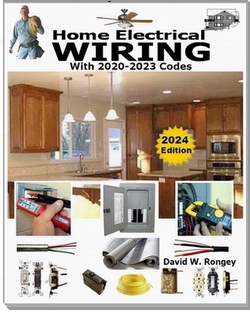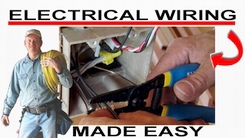» Home Electrical Wiring
» Electrical Wiring Directory
» Residential Home Wiring Diagrams
» Need Electrical Help? Ask the Electrician
» Residential Home Wiring Diagrams
» Need Electrical Help? Ask the Electrician
Wholesale Electrical Suppliers
 |
By Dave Rongey
Summary: Electrical Wholesale Supply Houses can be found in your area and many will allow homeowners to purchase from them. If you are planning a major remodel project you may want to apply for an account and possibly receive a discount on your materials. © By: Dave Rongey |
Learn about Purchasing from a Wholesale Electrical Supplier
We all want two things when it come to parts - the right part at the right price.
The reality is that to accomplish this you may have to make a few trips to suppliers to get the lowest price - but what about your time and the high cost of gasoline?
What I have resolved to do is support my local wholesale suppliers. Lets face it - we need to support our community as well.
Sure, if I'm down in the big city and I see that Home Depot or Lowe's has a very good price on Romex I'll pick up a few rolls, but it doesn't make sense to make a special one hour trip to save five bucks.
Wholesale Electrical Materials Used by the Professional Electrician |
Examples of Wholesale Distributors
|
|
|
|
Lets get Serious about the Electrical Parts you need
Be sure to ask about the supplier's prices. The wholesale house has no price tags, unlike Home Depot and Lowe's where you know what you're going to pay before you check out. The pricing at most wholesale suppliers is going to be best for the most common materials and hinges on corporate purchasing agreements. I would advise you to get a few comparative prices for the non-common types of materials. Material costs add up fast and it may be worthwhile to either talk to your supplier about discount prices for your project or make phone calls and compare prices and brands. My Personal Perspective on Electrical Wholesale Supply Companies In tough economic times we are all need to be careful with our resources, however to choose success for not only yourself but the people you do business with makes a big difference to me. From a contractor's perspective it is difficult doing business with any material supplier who does not make good use of the technology tools that are available, not only at the local supply house but on the corporate side as well. Now I will admit that I am a little more techno-savy then your average contractor, but I sincerely feel that those who choose not to learn about and use today's technology will suffer in the duration, and the same goes for corporate wholesale suppliers. I have witnessed firsthand large companies who choose not to advance with technology, and some who make wrong decisions because of a lack of understanding, and this is a disservice not only to themselves but to their clients as well. Having a well throughout system that enables account holders to access their account online to the point of seamlessly accessing their past purchasing transactions and downloading this information into their Contractor Billing Software is just one example. Being able to place orders online is another, and this is all possible, the technology is already in place and ready to implement. So what's the problem? I would answer Money and the Right People. Decisions are being made through out the industry that will either make or break the future of any company. The business for a particular industry such as electrical will always be in demand, but those who make the right choices will be the leaders. Finding a Good Electrical Supply House Wholesale Supply Houses can be found in your area, and many will allow DIY ers to purchase from them. If you are planning a major remodel project you may want to apply for an account and possibly receive a discount on your materials. Electrical Materials I have seen folks come into a supply house and ask about how to do certain projects. You must understand that many people who work at a supply house have limited experience with the trade and may not be able to help you. Their specialty is knowing about their parts and selling them to you. Some on the other hand may have an experienced person working there, or possibly a friendly contractor at the counter who may be willing to help you out. Free Electrical Advice Let me mention that you could experience a mixed atmosphere while at the supply house - especially if it is filled with a lot of contractors. The supplier has to be careful about giving homeowners "Free Advice" - lets face it, they have no idea what your abilities are or how you are going to interpret the information they may share with you - not to mention liability. Home Electrical Projects - Your Decision - Your Liability Understand that as a do-it-yourself er, you assume ALL Responsibility for Your Work - It is YOUR DECISION to take on your project and you choose to accept Full Responsibility for what You Do. Asking questions about how to do something can put a supplier and contractor in a uncomfortable position. I've heard this happen many times. I have spoke with homeowners to try to help them, but if I ever sense that they are unqualified, I always encourage them to hire a qualified professional to do their work. Electricians and the Economy Another situation you may "feel" is that you may be standing amongst contractors who are in need of work, and there standing along side of them at the counter is a homeowner who is doing a project themselves - in essence, doing a job the contractor would love to be hired to do. So just be aware of these conditions that you could experience. Just remember, we contractors want to feed our families too! Most Electrical Wholesale Suppliers are Open to the Public I've encountered two scenarios with the wholesale supply house and homeowners. One is that the supplier accepts them, the other is that the are closed to them and they do business only with licensed contractors. The latter is not the case in most areas because the supply house wants your business. Part of this is due to so many contractors doing business with the large competitors such as Home Depot and Lowe's, however most supply houses really want to support the homeowner, in fact - several have added displays and showrooms to help you see part of their product lines. A wholesale supplier does not have aisles for you to push a cart down, but rather a counter where you tell the sales person what you need, then they go gather your parts. Make the Calls - Ask the Questions Here's what I recommend: First - understand what parts you need for your project. This web site will do its best to provide project information with a material lists. Locate your local supply house(s), and give them a call. Ask for either a Manager or the Accounts Representative. Tell them who you are and give them the basics of what you're doing, don't go into a big explanation - keep in mind, most supply houses are dealing with busy contractors who are waiting to get their parts so they can get back out to their jobs. Be specific about your parts list, ask them if they carry the parts your looking for; then listen to their response which will give you an indication of whether you want to do business with them or not. Keep in mind - they are a "Electrical Supply House" not an "Electrical Information Center". The Homeowner DIY er Market I should point something out here - there are a lot of "Do-It-Yourself" books which may not be written by Electrical Contractors. The majority of the pictures that you see in those books are with hired "models" not contractors. You can tell by looking at their tools - they are always brand new, and they never make a mess- Amazing! Well folks, these books are written with the DIY er in mind, and they know that the majority of these people will go to one of the big Hardware Stores to buy their parts. There are many of these types of parts you will never find at a Contractors Whole Sale Supply House. Why?, because the pros use the materials the pros use, and they DIY er Hardware Stores are locked into purchasing channels that are geared towards high profit margins. Oh sure - these parts will get the job done just fine, but understand that they may not be the same grade of material or type that a professional electrical contractor would install. |














